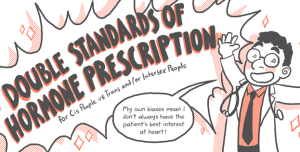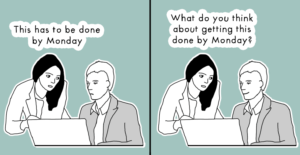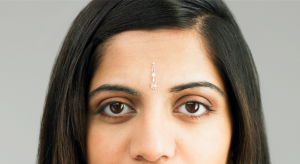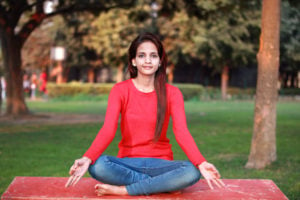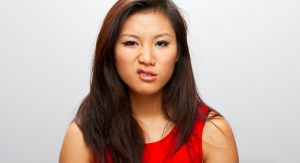So I am Jes Baker, and I’m here tonight to talk to you about one of the most radical and controversial subjects out there, that concept being complete and total body love–body love and the impact it has on us individually and also the impact it has on our society as a whole.
So we’re going to talk about a few things tonight, a handful. We’re going to talk about the state of the world we live in right now. We’re going to chat about the things we can do individually to start our own self love journey. And then we’ll talk about what those actions do for the rest of the world.
So I get a question a lot, but I want to ask you one first. My question for you here in the room tonight is how many of you would feel comfortable tonight, looking me in the eye, and telling me that you can call yourself beautiful or handsome? How many of you can call yourself beautiful or handsome tonight? Some. Good! Good.
Those of you who did not raise your hand, you are not alone because the statistic globally is that 4% of women will call themselves beautiful, and in my experience, men are very similar. So that leaves 96% of us that feel inferior and not good enough because of our body. And it’s tragic because it doesn’t have to be that way.
So the question I’m asked is, “Why is body love so important?” Usually people say, “Jes, why are you so superficial? Why do you focus on the body and not on a personality, or talents, or the things on the inside?” And I like to talk about that stuff, but the body is really important because the way we view our bodies determines they way we participate in the world. So the way we feel about this impacts all of this. And if you think about it, collectively all of our participation shapes the world we live in.
So here is some really sad real talk. 81% of ten-year olds are afraid of being fat. It’s their biggest fear. It’s bigger than cancer, war, or losing both of their parents. In a survey of nine- and ten-year olds, 40% of them have tried to lose weight. That is almost half of our 4th and 5th graders who are dieting, folks.
And then as adults, 91% of women are unhappy with their body. Ninety-one percent. And the interesting thing is that only 5% of women naturally have the body shape that we see in the media so that leaves 95% of us–pretty much all of us–unable to achieve that in real life. So we have this failure, shame, failure, shame–it’s just really quite ugly.
So what happens because of these statistics? What does that look like? It looks like a few things. How does that impact us? We see low self-esteem. We have bad days just because of our body. It’s really too bad.
We put our life on hold. We say, “I’m gonna go jean shopping once I lose ten pounds,” or “I’m going to take that photo with my family after XYZ,” or “I’m going to start dating after fill-in-the-blank.” How many of us have done that? I have. A lot of us have. We put our lives on hold; we stunt it because of the way we feel about our bodies.
We see poor relationship skills. We feel unlovable and undeserving. Women with low self-esteem are more likely to stay in abusive relationships.
We see employment losses. People who have low self-esteem do make less than their confident counterparts, so it effects us at work.
We see the creation of or triggering of a mental illness. Maybe something’s dormant and it’s triggered by social trauma, or maybe we develop symptoms of depression or anxiety or borderline borderline personality disorder.
We see dangerous eating disorders–also mental illness. Those can be fatal.
And we see suicide; people who would rather die than live in this body that they perceive as flawed. Which is a lie.
So it’s a little more than warm, fuzzies. It’s kind of a big deal. These are huge social issues that we’re dealing with. The core of my message is that we can transform our lives if we learn to change our world and not our body.
Little bit about me: I run a blog, it’s kind of a big deal. I’m really glad to have the platform. I’m also a founder of the Body Love Conference which just happened here at the University of Arizona, and it was wildly successful, which just reiterates to me how important this concept is.
I’m also known for visual campaigns. This is the Attractive and Fat that, as we mentioned, was in response to Abercrombie. The CEO said, “We don’t sell extra large shirts to large women because we only sell to the cool kids,” saying that women who are larger are valueless. So I teamed up with Liora K and we made a counter-campaign that showed that sexy isn’t a size and that, in fact, women who are larger do have value.
But you don’t have to know any of that stuff because I’m about to tell you the one thing that you really do need to know about me. Only one thing. And that is that I am fat. Is anybody shocked by that? It’s pretty obvious, right?
Okay. So as a fat person in society, I’m put into boxes. I’m a cultural deviant. I am a freak of physical nature. I am an embarrassment to society. When we moan and groan about the obesity crisis in America, they’re talking about me. And I’m your worst nightmare. I’m the reason you diet. I’m the reason you go to the gym. I am your fitspiration because you do not want to end up like me.
I was unwillingly put into these boxes but because I was, I had to make a very black and white decision and that decision was: will I hate my body, or will I love my body? There was no gray area. I wasn’t going to lose 110 pounds overnight and suddenly be okay. And I decided to love my body.
That became transformative for me, and for the millions of people that I touched for sharing my journey online. I still continue to get emails every day from across the globe about this concept. That’s why I do this, and that’s why I’m here today.
So body love is important; I think I pounded that one into the ground. So what can we do about it? I’m going to give you 10 tools that you can use to encourage your body love, and then I’m going to tell you what it does for the world.
Number one: Start now. Tonight, in this room, this very second. Committing to body love is a very interesting thing because I found pictures of myself from the last 10 years and I had a little meltdown a little while ago because I was thinner in them, and therefore more beautiful. And I thought, maybe if I was more like that, I would be more successful, I would be happier, I would have a hot boyfriend.
And then I had to stop myself because I’m happy now. And I realized that happiness is not a number on a scale; it’s not a size. It’s a state of mind where we say, “I am okay just the way I am.” And we can start that tonight.
Number two: We need to recognize that body hate is learned. Does anybody remember being a kid and we thought our bodies were the most wondrous magical things. We could put our toes in our mouths, and we showed the world our belly. There was no shame. We transformed into this. The interesting thing is because it was learned, it can also be unlearned.
Let’s learn why we’ve learned to hate ourselves. It’s deeply rooted in history, from the transition from hunter-gatherer to farming, where women became property and therefore the target of our advertising today; to the slenderization for class distinction. That happened in the late 1800’s. The rich created–not the physicians, the rich–created the obesity parasite and that way they would be able to be differentiated from the poor.
And then, World War II was very influential. Before women had buying power and housewares, when the men left and they went into factories, they found independence. So when they went back to the houses, a majority of them were dissatisfied and they stopped purchasing the way they were, and marketers freaked out. And so they created two new markets that would not fade with time: beauty and age. You would always have bodies, and we’ll always get older.
And they created this perfect woman–because we’re the targets, right?–perfect woman that does not exist, will never exist, and said, “You should be this,” and we bought it. All of us have bought it because it makes millions of dollars to this day.
But if you remember that list of the way it affects us, it comes at a very high cost for the rest of us.
If we re-frame health, if we challenge what we’ve been told, a very interesting thing happens. When we look at the fact that skinny can be healthy, and fat can be healthy; skinny can be unhealthy, and fat can be unhealthy, it takes weight out of the equation. What! That’s how we determine health, guys! Mmm. We need to educate ourselves because it’s not all true.
There’s this really interesting book called Health at Every Size and it talks about the concept of treating our bodies well because we love it, not because we want to change it. We need to reeducate ourselves. Learn the truth.
Who here has heard of Photoshop? Has anybody not heard of Photoshop? I didn’t see a lot of hands go up! Even if we know about it, we still need to remind ourselves that that is what exists in real life, not that. That Jessica Alba doesn’t actually look like Jessica Alba, and that Photoshop is in everything that we see online and in print. Even George Clooney is not allowed to age, which is tragic. Poor George Clooney.
Okay, so we need to normalize mental health. So, 1-in-4 adults will experience mental illness in any given year. One in four. We tend to think that these are the only people who need mental health resources, but I propose that 4-in-4 adults need mental health support. We all have brains, none of them work 100%, and we live in a society that tells us we’re not enough. So if we de-stigmatize mental health as a whole, we might be able to access resources to keep our brain and our body happy.
Okay, I’m not an advocate that’s gonna tell you to turn off your TV and burn your magazines because I really love Millionaire Matchmaker. That stays in this room, guys. I love Patti and her crew.
But what we need to do is not get rid of it, but we need to diversify our media feed and add in images of reality so that we don’t think that there’s one standard of beauty. And it’s amazing what that does!
Let’s increase conversational awareness. We think that people’s bodies are public property to comment on, mmm. Let’s talk about ourselves, and let’s talk about it positively. And along with that, we have to stop calling thin women sellouts and fat women lazy. We need to build each other up instead.
Create your own affirmation. Neuroplasticity is your friend. We can rewire the way we think. We have post-its for you tonight. This is the post-it challenge: you take a post-it note and you write one thing that you love about your body, and if you can’t think of that, an affirmation. Something like this. So you write it on that post-it and you put it in your house wherever you have the most negative thoughts, maybe a mirror. And every time you go to that mirror and you have a negative thought, you read that post-it out loud. And what that does is it stops that negative thought process. Because the negative and the positive cannot exist at the same time. So it jumpstarts your brain in a positive way and if you do that enough, you will see a change.
And number ten: Wear what scares you. I had the hardest time wearing a crop top in the beginning. The breeze on my belly just felt unnatural. Six months later, totally nude, New York City, famous photographer, and there was an audience. And I’m not saying that all of you need to do that. You don’t have to. But what I am saying is that starting with that crop top, something that terrified me, translated into the bravery much later.
So here’s a bonus pro-tip from me to you. Allow yourself to have bad days. We’ve been brainwashed our entire life. There is no way we’re gonna get over that overnight. So we’re gonna fall down, and that’s okay. When we fall down, we just get right back up, we brush ourselves off, we give the media the finger, and we keep on going as the body warriors that we can be.
What if you don’t believe me? What if you think that this is a bunch of mumbo-jumbo. That’s okay. I’m not here to tell you what to do. It’s your body, your life, your rules. But I’m just here to suggest that there is an alternative way of thinking that we don’t have to loathe ourselves for the rest of our lives.
Okay, so what’s the payoff? If we embrace everything I just talked about, what’s going to happen? Well, each and every single one of us will live happy, fulfilling lives. But that’s not all. It’s enough, but it’s not all. There will be a societal shift as well.
We will see self-induced depression minimize. Mental illness will not go away, but that which we create from self-doubt, self-loathing, will. We will see increased confidence and goal-setting.
Lots more dollars: we spend thousands individually on beauty and weight loss products. How many of you need a vacation? Yeah! That money can go there. It’s the same thing with time. We spend so much time trying to cover up our flaws, and if we spent that time somewhere else, what would happen?
We would have better communication and relationships at home, at work, with friends. And there’s no research to back this up, but I think we would have more sex. And a world full of orgasms, guys, is one I wanna live in. Don’t you?
So we can breathe life into our communities on a global level if we embrace body love. Let’s go back to that question I asked in the very beginning. The few of us that raise our hands and the rest of us that weren’t feeling it: we can change that. We have the power to change that.
We have the power to change the statistic, and that is because our decision is internal. So no one else can stop us. That’s the exciting thing. No one has a say in whether or not we love ourselves. It’s our internal decision to look at the status quo, and say, “I’m not buying that anymore.” We define what beauty is, and because we say it is beautiful, it is so. It’s a really amazing thing.
So I’m going to tell you something that you might not know. And that is that every single one of you in this room is perfect just the way you are. And when we learn to embrace that, we not only will see the way our perception of the world will change, sure. But we will also be joining this giant revolution that will completely shift the world that we live in. Thank you.








